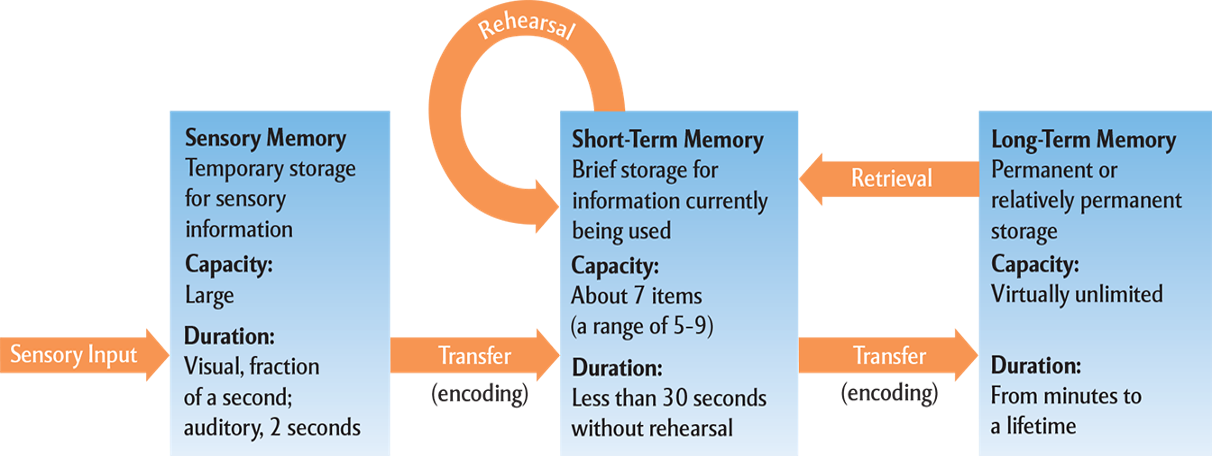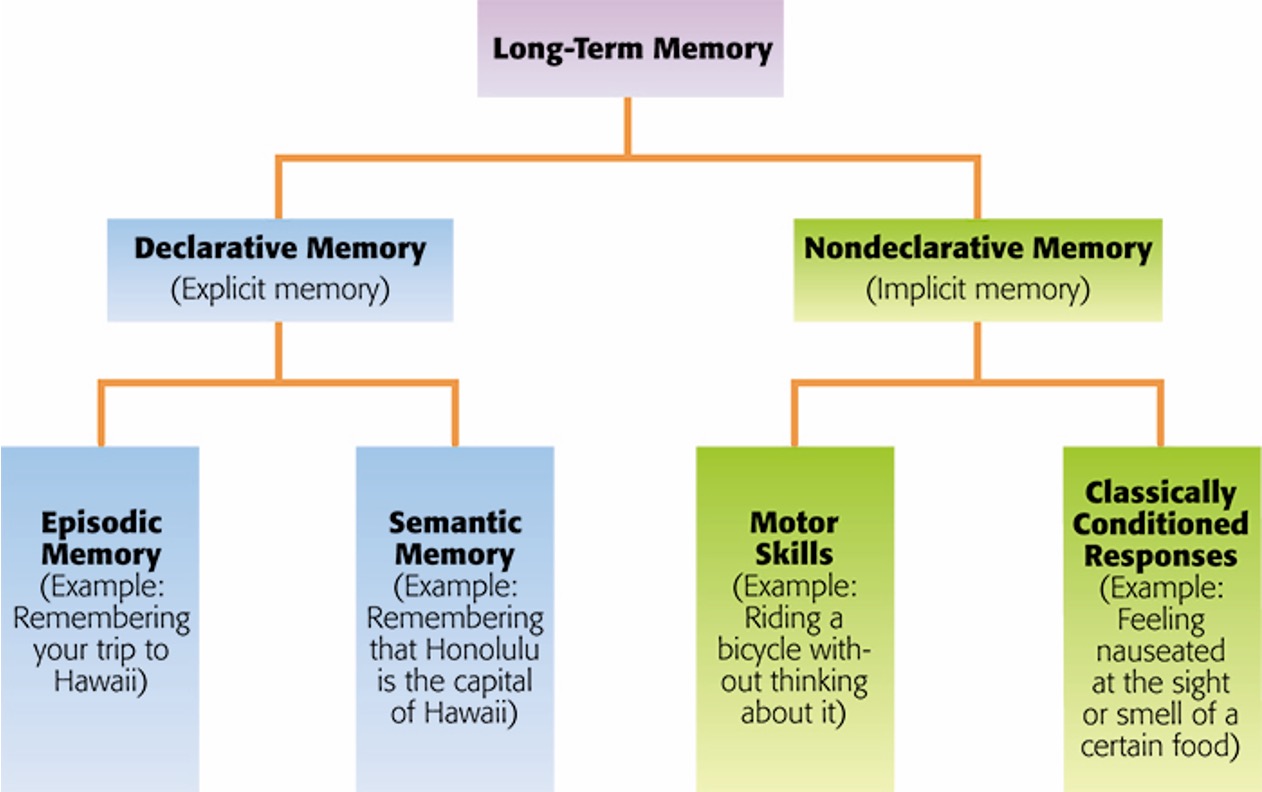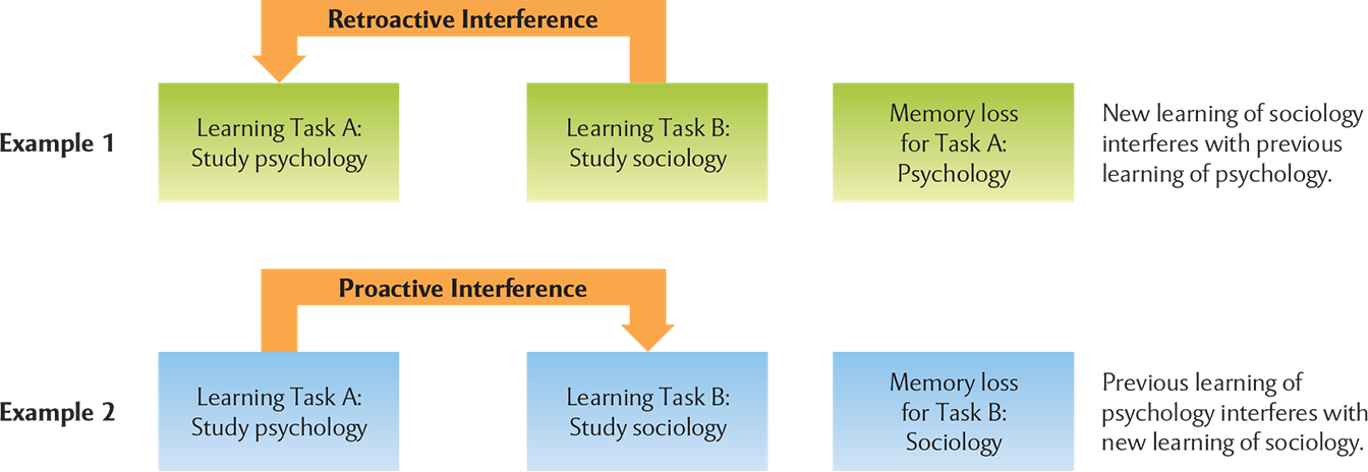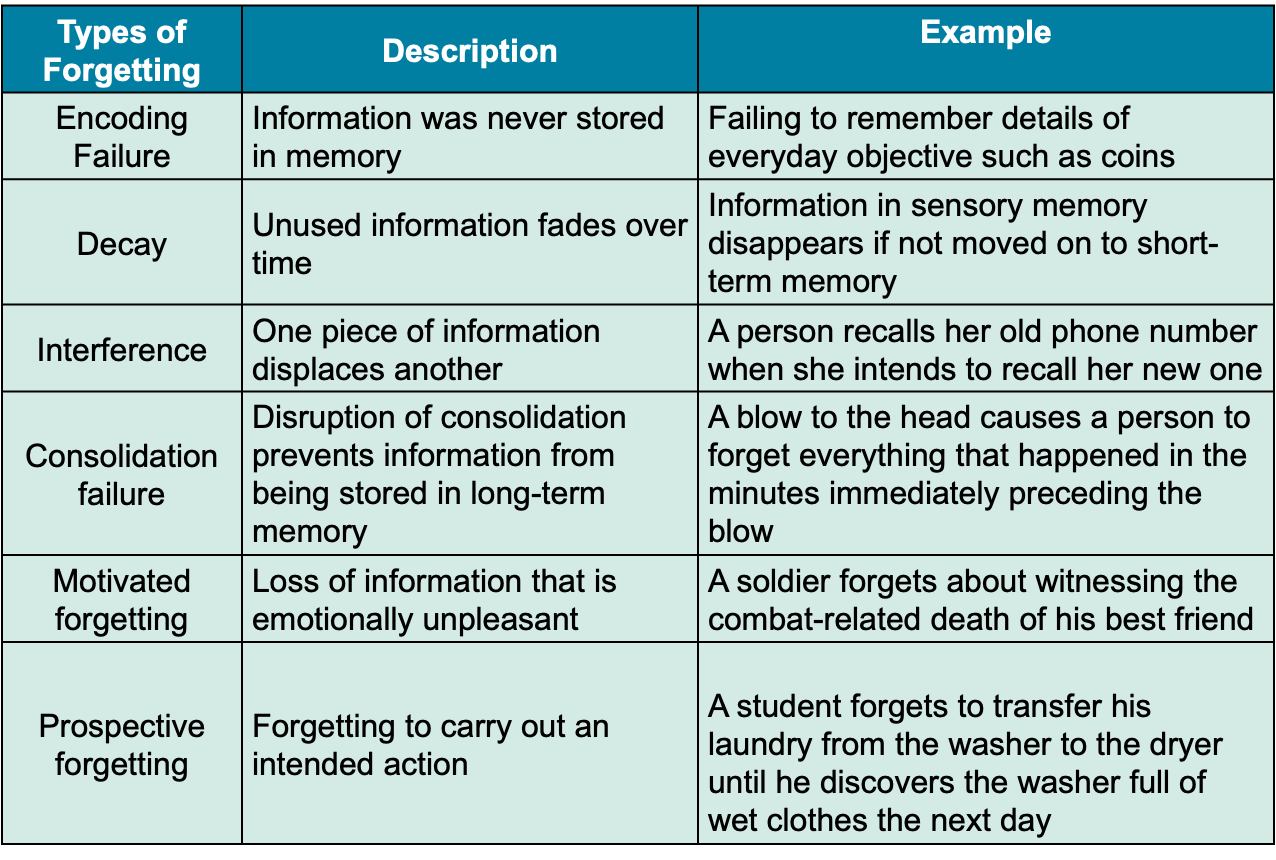Chapter 6
Watch video: Remembering and forgetting psych crash course 14 Memory is like a web that we slowly peice together but not everything sticks to the wall

Video Notes: crash course memory
Word of the chapter: reconstruction & Schema
Where are your memories? (hippocampus and other parts of the brain)
Your Brain Doesn’t contain memories. It IS Memories-wires
Where Are Memories Stored? MIT researchers have shown, for the first time ever, that memory bits are stored in specific brain cells
Where Are Old memories Stored in the Brain? - A new study suggests that the location of a recollection in the brain varies based on how old that recollection is - Scientific American
Don’t think abt just the neurons but everything peicing itself together to create the recolleciton of that bit of information.
The Structure of Human Memory: What is Memory?
Information-Processing Theory
How do we store information in computers and then they molded today
(Klutzy, 1984)
Makes use of modern computer science and related feilds
Characterizes the brain and spinal cord as “hardware”
Provides models that help psychologists understand the processes involved in memory (Bishop, 2005)
The structure of Human memory: Information Processing Theory
Memory involves 3 distinct processes
Encoding
Storage
Retrieval

Memory
one of many cognitive processes that includes the encoding, storage, and retrieval (recollection, recall, remembering) of information.
Redundant!!
Richard Atkinson and Richard Shiffrin
Proposed the most utilized theory of memory, characterizing memory as 3 different, interacting memory systems:
1) Sensory memory
2) Short-term memory
3) Long-term memory

The Structure of Human Memory
Sensory memory
Briefly holds information from the senses
visual information: for a fraction of a second
Auditory information: up to 2 seconds
Short-term memory
(focus on one thing at a time to remember everything so you don’t have disruptions in information processing)
Capacity of short-term memory: seven (plus or minus 2) items for less than thirty seconds without rehearsal
Working memory: a system of sensory memory, helps us understand information, remember it, problem solve or to communicate (what we’re conscious of at any moment).
Duration: Memories are lost in less than 30 seconds unless rehearsed
Managing Short-Term Memory (STM)
* Leila don’t forget that STM means short-term memory you dumbass
Displacement
occurs when STM is full
new incoming item pushes out an existing item
Chunking (strategy)
grouping bits of information into larger units
Makes more efficient use of short-term memory
Short-Term Memory: Levels of Processing in Working Memory
Maintenance Rehearsal
“shallow” processing
encoding based on superficial features of information
Elaborative Rehearsal
“deep” processing
encoding based on the meaning of information
requires added intentional effort, focus and concentration
Short-Term Memory: Automaticity
Automaticity
instantaneous memory/ easily able to recall
ability to recall information from long-term memory without effort
allows working memory to be freed up for other tasks
Memory abilities vary from individual to individual
The Structure of Human Memory: Long-Term Memory (LTM)
Virtually unlimited capacity
Contains vast stores of a persons’s permanent or relatively permanent memories
Main Subsystems of LTM
Declarative memory (explicit): declared or stated
Non-declarative memory (implicit)
Long-Term Memory: Declarative Memory
Explicit memory: clear and complete
Stores facts, information, personal life events
Can be brought to mind verbally or in the form of images
Episodic Memory
records events as they have been subjectively experienced
Semantic Memory
stores vernal knowledge or objective facts and information
more like an encyclopedia or dictionary than a personal diary
Long-Term Memory: Non-Declarative Memory
Also called implicit memory
Stores motor skills, habits, and simple classically conditioned responses
Does not require conscious thought

Closer Look at Retrieval: Measuring Retrieval
Recall
task in which a person must produce required information by accessing memory, requires a more involved thought process
Retrieval Cue
any stimulus or bit of information that aids in retrieving particular information from long-term memory
Recognition
Merely identifying familiar material having been encountered before i.e. multiple choice exams
Note: you can’t however, retrieve a memory that’s not there!
Influences on Retrieval
Serial Position Effect
for information learned in a sequence, recall is better for items at the beginning and end than for items in the middle of sequence
better to rememberbeginning or end of a list
Primacy effect
tendency to recall the first items in a sequence more easily than the middle items
Recency effect
tendency to recall the last items in a sequence more easily than the middle items
Memory retrieval
Context Effect
we recall material more easily in the same environment in which it was learned (in the same context)
Golden and Baddeley (1975)
Participants memorized words underwater or on land
State-Dependent Memory Effect
the tendency to recall information better if one is in the same pharmacological or psycological state (mental state) as one was when the information was encoded
The effect appears to be greater for episodic than for semantic memories
Stronger when positive emotions are involved
Remembering as Reconstruction: The Process of Reconstruction
Reconstruction
An account of an event that has been pieced together from a few highlights
Sir Fredrick Bartlett (1886-1969)
Reconstructive memory processes employ schemas (frameworks of knowledge we have about people, objects, and events). We use schemas to understand the world around us
concepts, understandings, narratives etc
Schema-based processing is even more evident when processing more complex information
Using schemas to reconstruct memories can lead to inaccuracies
Discussion: subjectiveness and contamination
Source memory
a recollection of the circumstances in which a memory was formed
Source monitoring
practice of intentionality keeping track of the sources of incoming information
The memory system tends to focus on the meaning of information rather than its source
Flashbulb Memories
Memories of particularly shocking/powerful, emotion-provoking events
Include information about the source from which the information was acquired
reconstructive in nature
Essentially a subcategory of source memory
Autobiographical Memories (also episodic memory)
recollections that include an account of the events of person’s own life
reconstructive in nature and include factual, emotional, and interpretive information
positive bias
Pleasant autobiographical memories are more easily recalled than unpleasant ones.
Studies show that memories of unpleasant events become more emotionally positive over time (????)
Influences on Reconstructive Memory
Expertise
possessing extensive background knowledge that is relevant to a reconstructive memory task
the more you know about a certain topic, the more likely you’ll recall information
Sociocultural factors
may influence ability to remember certain kinds of material
Forgetting: Ebbinghause and the Curve of Forgetting
Learned and relearned more Ethan 1,200 lists of nonsense syllables to discover how rapidly forgetting occurs
Curve of Forgetting
Most forgetting occurs soon after learning, then tapers off
Note: The less meaningful the material is to you, the more likely you’ll forget
Forgetting: Why Do We Forget?
Encoding Failure
occurs when information was never put into long-term memory.
In certain instances, encoding failure may be the result of distraction, disruption
Remember the traffic light?
Decay Theory: a physiological change or deterioration in the neurons and neuronal pathways involved in the formation, storage and reconstruction of memories
some memories, if not used, fade with time and may eventually disappear, or not!
Bing Bong from Inside Out
retroactive v proactive

Forget it (I forgot what I forgot tbh)
Consolidation: physiological process by which encoded information is stored in memory, also explained in theories of dreams and the need for sleep.
Consolidation Failure
disruption in the consolidation process that prevents long-term memory from forming
Prospective Forgetting (avoidance learning)
not remembering to carry out some intended action in the future: taking out the trash
Most likely to forget action perceived as unpleasant
“Forgetting” to read the chapter, for instance
Retrieval Failure
not remembering something one is certain of knowing
tip-of-the-tongue (TOT) phenomenon
knowing information has been learned but being unable to retrieve it
may be due to the physiological process of reconstruction
Intentional Forgetting
Motivated Forgetting (intentional)
suppression or repression in an effort to protect oneself from material that is painful, frightening, or otherwise unpleasant (Freud’s repression).
Mike’s memory meaning theory. Who decides what out memories mean or for that matter, what ANYTHING means!??!?

Biology and Memory
Hippocampus
plays an important role in forming episodic memories
LTP: long term potentiation, increased efficiency of neural transmission at the synapses. increased stimulation strengthens processing
Our strongest and most lasting memories are usually fueled by emotion
Epinephrine (adrenalin) and norepinephrine (noradrenaline) activate the amygdala (sympathetic nervous system activation)
help imprint powerful, enduring memories for threatening events
recall the “fight-or-flight response”
Excessive levels of cortisol can interfere with memory such as when you’re under chronic stress
Estrogen appears to improve working memory efficiency in pre-menopausal women
Memory Loss
Amnesia
partial or complete loss of memory
due to loss of consciousness, brain damage, or some psychological cause
Anterograde amnesia: inability to form new long-term memories
Retrograde amnesia: loss of memory for experiences that occurred shortly before a loss of consciousness: involves episodic rather than semantic memories
Dementia: a collection of neurological disorders in which degenerative processes in the brain diminish people’s ability to remember and process information
altered personality and behavior
individuals with dementia can lose episodic and semantic memories
can result from cerebral arteriosclerosis, chronic alcoholism, strokes or other insult to the brain
Alzheimer’s Disease
a form of dementia caused by degeneration of brain cells and nerve connections, making it progressively more difficult to do ordinary things like move around, swallow and feed oneself. It is thought to be caused by the abnormal build-up of proteins in and around brain cells as well as other causes.
High IQ plus lifelong intellectual activity are thought to delay or lessen symptoms of Alzheimer’s
Memory in Legal and Therapeutic Settings
Because most of human memory is reconstructive;
Eyewitness testimony is highly subjecttoerror
should always be viewed with caution (Loftus, 1979)
The physiological stress and fear of being a crime victim or witness affects memory encoding
Re: interaction between the amygdala and hippocampus
Memory Contamination
Misinformation Effect
erroneous recollections of witnessed events
results from information learned after the fact 9retroactive interference) or from other sources
Repressed Memory
Repression : Freud
“defense mechanism”
process by which traumatic memories are buried in the unconscious
Hypnosis and guided imagery are often used to help clients recover repressed memories of childhood sexual abuse
Critics argue that therapists may sometimes implant false memories in clients
Infantile Amnesia
relative inability of older children and adults to recall events from the first few years of life
hippocampus in th brain is not yet fully developed!